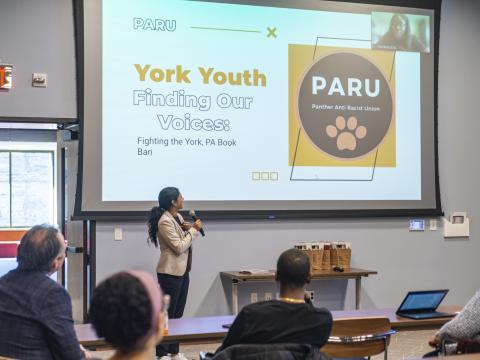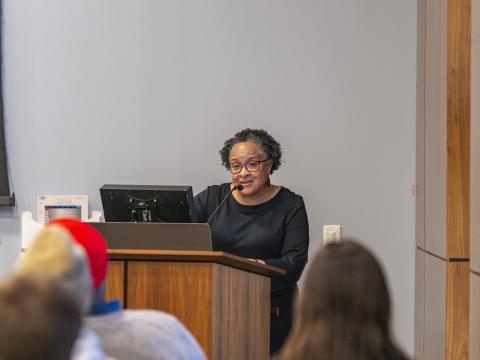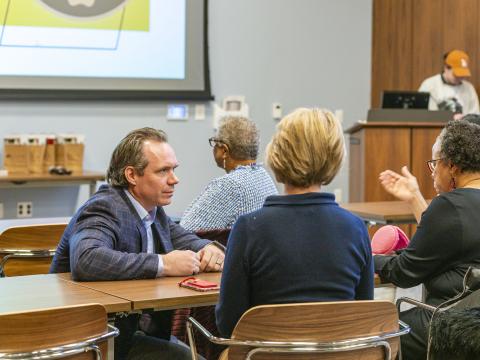Celebrating MLK by Celebrating Young People who Push Back; Young People who Lead

This past MLK day, members of the Haverford - Ardmore community and college engaged with activists who had experienced challenging institutional racism and book bans in times past and present. Photo by Patrick Montero.
Details
This MLK Day, members of the Haverford-Ardmore community and students at the college attended a CPGC - conversation with two former students from the York Central school district who were instrumental in challenging a book-ban there, plus three local Philadelphia educators/authors. The event also marked the inaugural CPGC Award for Creative Maladjustment and Youth-led Social Change.
Provost Linda Strong-Leek introduced the five presenters, remembering the invaluable role of books and literature in her own life, reflecting upon how, “access to books is one of the most powerful tools in our arsenal to challenge injustice, inequity, and ignorance.” She prefaced the special guests by acknowledging the profound implications of freedom of press.
“We know that writers are often targets of totalitarian regimes. They’re jailed, they’re killed, they’re tortured. But surely, we should have access to what we want to read in the United States of America,” she said. Strong-Leek then welcomed Central York Schools Panther Antiracist Union former President Edha Gupta and former Vice President Christina Ellis. Gupta and Ellis were a part of this teacher-student coalition responding to the censorship of literature produced by diverse authors.
Gupta and Ellis offered an overview of their work followed by a practical presentation of strategies and takeaways for student activists.
“We want to provide any student that is searching for more information on these topics and issues with our story,” said Gupta.
In September 2021, the all-white district school board banned the reading, teaching, and even mere discussion of a number of books written predominantly by LGBTQ+ authors or people of color. According to Gupta, on August 29th, 2021, teachers were prompted to inform their students about the ban. After nearly two weeks of mobilizing, on September 20, the board finally overturned the ban.
“Every single day, in the morning before class started, 70 + students and ourselves held signs like ‘my voice matters’ and ‘diversity is education’ outside of our school, protesting,” Ellis explained. “The first day back to school when we heard about the book ban was a 'blackout' — kids who were against the book ban wore all black to show that they were against the school board decision.”
Gupta stressed how students and teachers mobilizing as part of PARU ultimately garnered success because they joined forces in the face of opposition, and bounced back after initial roadblocks. They also achieved their goals vis a vis nonviolent direct action to gain attention and make the news in conjunction with a host of other advocacy strategies.
“[For] 2 weeks until September twentieth, it was just non-stop going to board meetings, talking to the Board, sending emails, having local news interviews, talking to students, talking to teachers, educating people on what is happening and really being advocates,” Gupta recalled.
Community presenter Joyce Mosley, a lifelong Ardmore resident, recalled the struggles her generation faced as high school students during the 1960s in Lower Merion school district. At that time, books by Black authors were painfully absent from the shelves of school libraries.
“We wanted to know why our education wasn’t as important as the education of the other kids in the school district. It took us months to get the school board to realize that they were harming the children that were a part of their care. Eventually, we prevailed.” Mosley went on to explain how almost 60 years on, activists like those students organizing with Ellis and Gupta are having to save many of the same books that were banned generations earlier. Youth, she explained, often deserve credit for holding library and education systems accountable. It is thanks to the work of young people then and now, like Ellis and Gupta, that our libraries and schools maintain-- and hopefully continue to expand--diversity of representation in their collections.
Mosley also outlined her children’s book Gram’s Gift, which is narrated by grandchildren who experience a family history lesson from their grandmother and is based on Mosley’s own family. Mosley discussed the importance of seeing one’s own history represented, in the context of the American story.
Another area local—Nahjee Grant—shared his personal experience in the Lower Merion school system and how finding a creative writing class lent him strength when he needed it, leading him to find his place as a children’s author, community educator, and entrepreneur. Like Mosely, Grant often includes himself or aspects of his experience in his writing. He is able to share his books with Philadelphia area school-children who can resonate with aspects of his own life story, including resilience from personal life challenges.
He is also founder and CEO and creative director of DayDream Kreative Studios in Ardmore.
“It’s a design center, but we also open up as a community center, for pretty much anything that the community wants to do,” Grant said. “I always say to myself ‘how can I be of service to others’ and whatever answer that comes is what I go with at the beginning of the year.”
North Philadelphia native Anyabwile Love is a bookshop owner and Professor of History and Black studies. He shared his love of reading and education, particularly situated within aspects that he feels are important to Black experiences in the United States.
He then prompted the audience to engage in thinking about the importance of books and libraries as spaces to steward history, knowledge, and truth.
As a self-proclaimed bibliophile, Love opened Bailey Street Books with the intent for it to be both a retail bookshop and a “research site,” with many from Black publishing houses and small presses that community members can make use of. The store will re-open this spring at a new site in Philadelphia.
Throughout the event, both presenters and audience members were able to consider MLK’s legacy of being “creatively maladjusted" in a very practical way, considering what it means to value, organize, and follow through on aspects of education and literary material that truly represent the United States in an inclusive and accurate way.
MLK on "Creative Maladjustment" (The Martin Luther King, Jr. Center for Nonviolent Social Change)
CPGC Executive Director Eric Hartman said, “We hope, with this award, to emphasize two things. First, it’s important that we refuse to settle for the world as it is. MLK spoke often of the importance of being maladjusted. He said, ‘I never intend to adjust myself to segregation and discrimination. I never intend to become adjusted to religious bigotry... I never intend to adjust myself to the madness of militarism, and to the self-defeating effects of physical violence.’ MLK taught us that it’s important to push back on what dominant culture might consider normal, making space for what’s right. Second, he was a young leader, and honoring his legacy must be identifying and — to the extent that we can — elevating young leaders that are moving us forward, extending his legacy. We look forward to working with our students on continuing to identify and elevate young leaders through this award in the years to come.”
Presenters were able to respond to audience questions and comments around social - change strategy in 2023, reflecting both on legacies of past organizers and ancestors, and what is unique to the current socio-political landscape. PARU students’ work continues today as Gupta and Ellis each navigate their first year of college. In their presentation, they reflected on the importance of their organizing within the larger context of racism in school. They both shared experiences of being unwelcome at times in the school district as POC students. Many of the microaggressions they and others experienced, even before the book ban, made their advocacy with other students and teachers all the more important.
--Naren Roy '23









